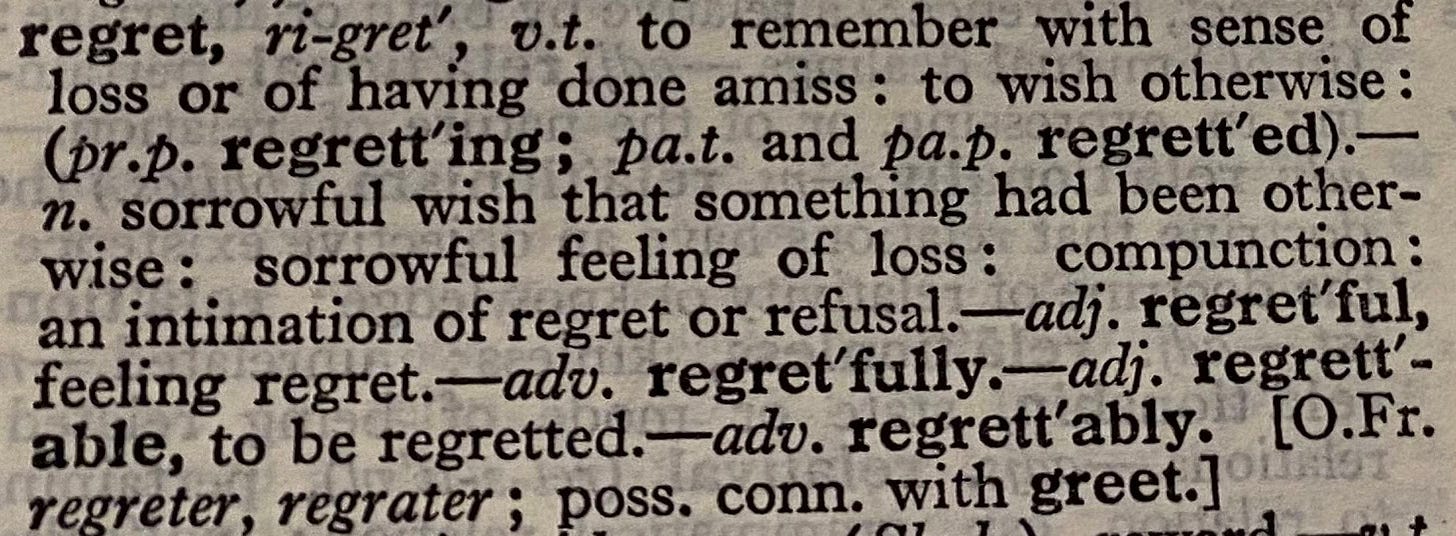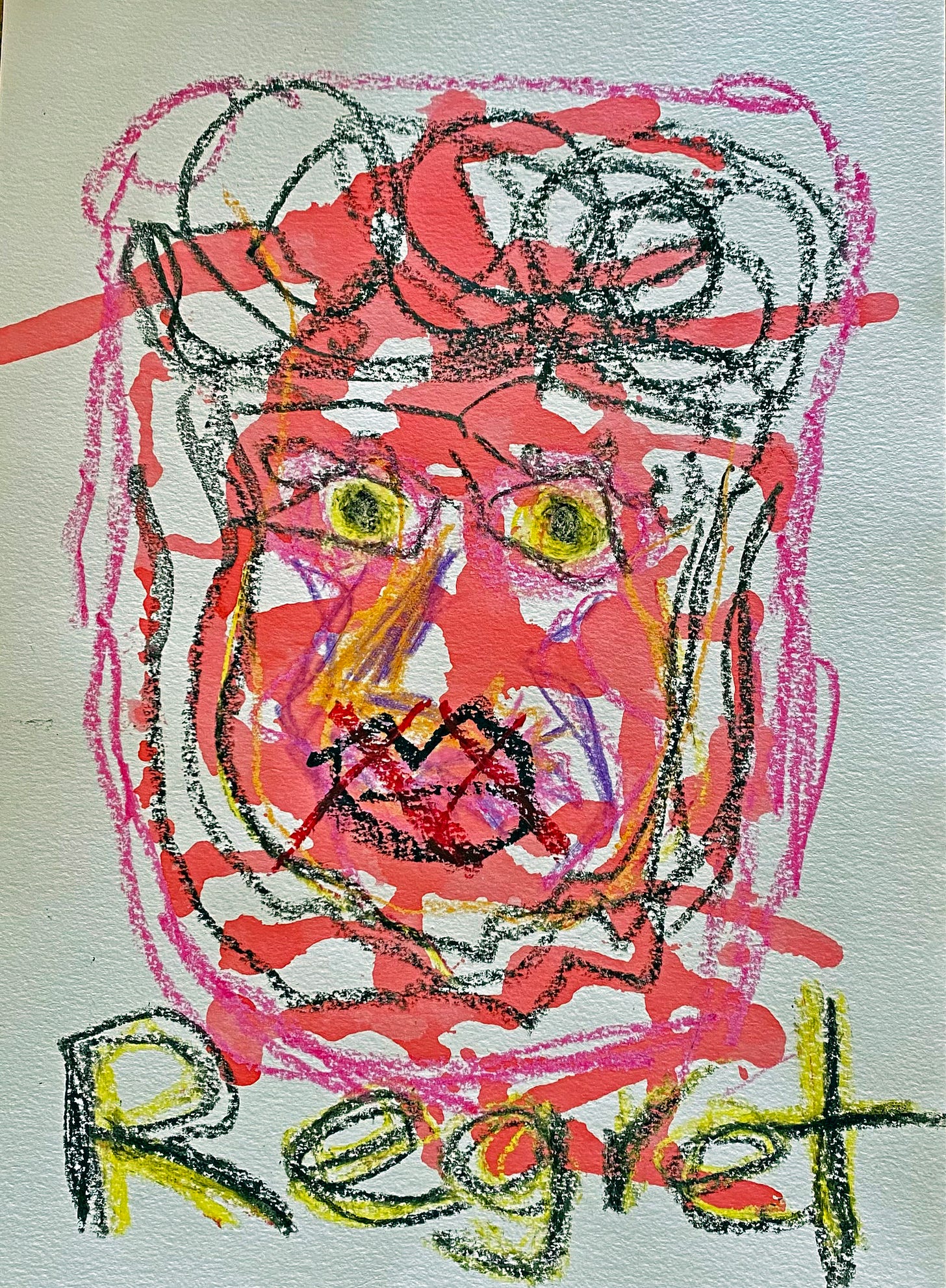The beginning of each new year is always full of promises and good intentions. As the months go by some intentions stay the distance while others fall by the wayside. And then just like that, life goes completely awry, the number one reason being we are flawed human beings, living in a flawed world with other flawed human beings. There are a lot of ‘beings’ in that sentence and a lot of ‘flaweds’. Stuff happens. Regrettable stuff.
A few weeks ago I said a torrent of unkind words to a loved one. I couldn’t seem to stop myself. I am horrified at how much emotional hurt I caused and I am experiencing a deep sense of regret and heartache.
Strangely, I experienced another dose of regret in the following days. Heading down a wide alley at our local shopping centre, I saw a middle-aged woman in a non-motorised wheelchair approaching. I noticed she was missing one leg. I also took in the shopping bags hanging off the back of her wheelchair and the stricken look on her face. My first thought was, ‘She is struggling’. I hesitated for a moment but I kept going. A few steps later I chastised myself for not asking her if she needed any help but when I turned around to see if she was still there she had moved on. Why had I hesitated? Did I feel I might be intruding? Maybe there had been a partner or friend waiting at the end of the corridor? But, again I felt regret.
The universe has been giving me a wake-up call, a masterclass in regret. We might as well add in its close relatives too — remorse, guilt, and shame. I told a close friend: I feel like I need a recalibration of my being.
I look up the word ‘regret’ in my falling-apart Chambers Twentieth Century Dictionary. It used to be my grandmother’s, then it was my father’s, and twenty-five years ago it was handed down to me. I like to consult this large tattered dictionary, perhaps hoping it might give me ancestral wisdom as well as clarity around words. This time I am transported back to a family era featuring Craven A cigarettes, scotch and soda in fancy tumbler glasses, and Frank Sinatra singing ‘I did it my way’.
Whilst the Chambers Dictionary suggests the word regret is from the Old French word regreter and possibly connected with the word greet, Caitriona King, an Irish Irish psychoanalyst, believes the word regret might be Scandinavian in origin — being akin to the Old Norse word grata, meaning ‘to weep.’ She describes regret in emotional terms as sorrow, grief, or pain and, in cognitive terms, as remembering and having misgivings.
In life we can experience two different forms of ‘regret’: regret for what we did, including causing harm, saying unkind words, making poor choices (actions); and regret for what we didn’t do, which could include not taking advantage of opportunities, not having children, not marrying that guy we were crazy about but our parents didn’t like … (inaction).
In facing regrets for what we did it is suggested that the best course of action is to offer a sincere apology, without expecting forgiveness, and to embrace deep regret as a motivation for change. Psychiatrist Irvin Yalom’s existential psychotherapy urges us to confront our regrets by 'living with death in our peripheral vision’ — using mortality awareness as a motivator.
Pallitative care worker, Bronnie Ware, spent a lot of time with dying people. She documented the regrets people facing death most often talk about in her book, The Top Five Regrets of the Dying:
I wish I had lived a life true to myself not the life people expected of me
I wish I hadn’t worked so hard
I wish I had the courage to express my feelings
I wish I had stayed in touch with my friends
I wish I had allowed myself to be happier.
Self-empathy is a useful tool for facing regrets over what we didn’t do. In the end, a well-lived life may not be one with no regrets but one where regret is transformed into acceptance and we are grateful for all that has been good in our lives.
Susan Kavaler-Adler in her book, The Anatomy of Regret, uses the term ‘psychic regret’ to capture the essence of the process of consciously facing regret.
Once the origins are understood that lead to the action or inaction that is regretted, and the grief and sadness of regret is felt, a person may then have the capacity to tolerate the loss felt, relinquish defences and enable repair of internal and external relationships.
Many religious and spiritual doctrines believe regret can help calibratre our conscience and motivate change. For example, Christianity views regret as the gateway to repentance. Regret alone, however, is not considered sufficient without a transformation, a turning of the heart to God.
Buddhism views regret as a useful mental factor if it leads to adopting the right intentions and improved behaviours. It cautions against clinging to regret as this can create suffering, and offers self-compassion as a way forward.
In Japanese aesthetics, the concept of mono no aware — a gentle sadness about life’s impermanence — resonates with the bittersweet texture of regret. Now that I am 71, I am experiencing a feeling of more than just a gentle sadness toward life’s impermanence. I am feeling a sense of urgency to make things right before it is too late.
American psychologist, James Tobin, believes that ‘regret is viewed by many experts to be a mental phenomenon conditioned by evolution … it is an evolutionary advantage for a species to learn from previous mistakes and to remember those mistakes so as to avoid future related mistakes.’
I hope this will be the case for me. To date, I have been a slow learner in some emotional areas of my life. A snake shedding its skin, I begin again.
By the way, my dear friend Anna Pryor has a new Substack, Confessions of a Diva. Zesty writing. Well worth reading …






Great work Lee. Don’t feel bad. I am continually kicking myself for being a grumpy old fart.
Do we get worse as we age? Perhaps. I do try to control it but sometimes let one slip.
Life is full of doom and gloom. We need more laughter/ fun.
Cheers
Rick♥️
Impossible to go through life without having some regrets. Thanks for sharing.